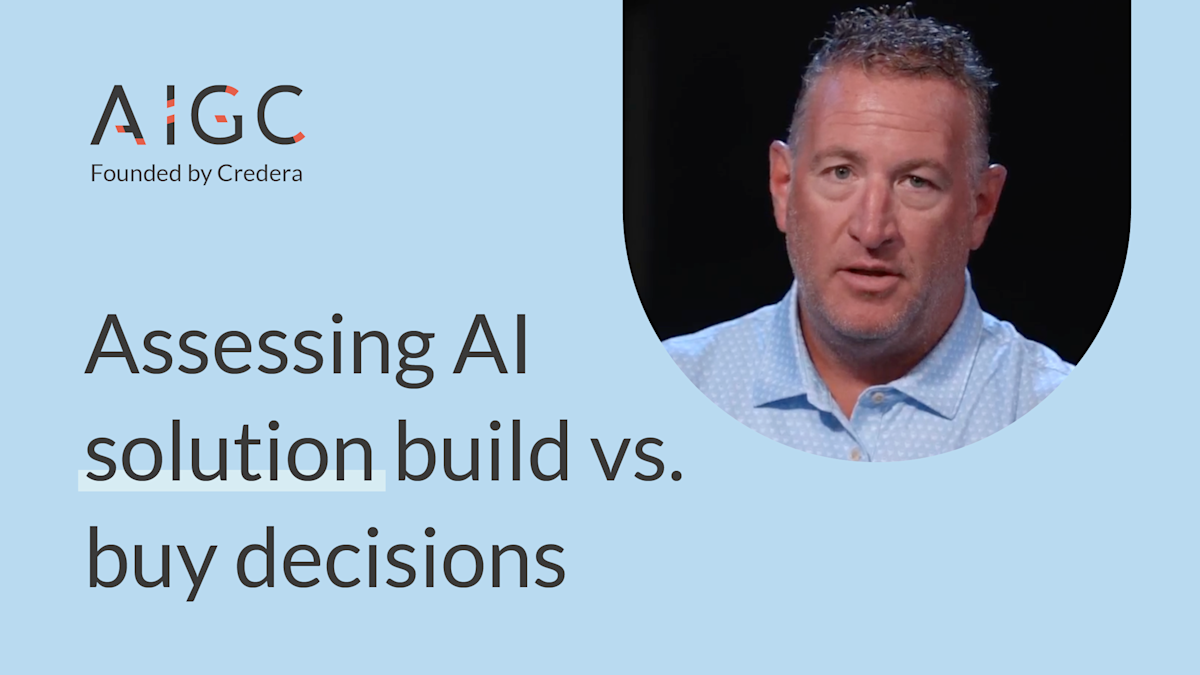AI
Nov 21, 2023
From the AI Global Council: 4 questions to assess AI build versus buy decisions

The AI Global Council is a collective of thought leaders from backgrounds spanning financial services to technology to law, joining together to address some of the world’s most pressing questions regarding artificial intelligence (AI) and its application in organizations.
In their first meeting, much of the conversation centered around the classic build versus buy debate: should companies delving into AI build, buy, or seek a mixture of solutions for their business?
Daniel Henry, former executive vice president and global chief information officer at McDonald’s, shed light on the discussion by suggesting leaders look toward buying rather than building AI solutions. Considering how rapidly the AI space is changing, the best first step may be one that requires the smallest level of investment. Henry expands on this suggestion by putting forward decision trees as a way for leaders to contextualize this debate to their specific business practices and hopefully find clarity in their path toward AI implementation.
Watch the clip here.
Diving into the questions to drive decisions
When working with a tool that has as many practical and theoretical applications as AI does, there are naturally a multitude of decisions that need to be made to ensure leaders pick the best solution for their organizations, whether they are building or buying it. Henry helps to simplify this process by outlining four main questions to drive decisions:
Does your organization want to be a fast mover?
Is the solution poised to be a strategic asset or commodity?
Does the solution contribute to organizational growth?
What does the broader ecosystem look like in comparison to your organization?
We’ll explore each of these questions below.
Question 1: Does your organization want to be a fast mover?
The first question leaders should be asking themselves is if they want to be a fast mover in their organization’s space. If so, then buying an AI solution is likely the best course of action. Buying a solution instead of investing time and resources into a custom-built one gives organizations the ability to have a review period, which can be crucial when thinking about how much time is needed for innovation and necessary modifications to happen quickly and organically.
Question 2: Is the solution poised to be a strategic asset or commodity?
The next area to consider is whether the solution itself is poised to be a strategic asset or another commodity for the organization. Are the resources and time invested into a custom-built solution going to be enough to differentiate an organization from their competitors, and is focusing on market differentiation a priority for leaders right now? If not, buying a solution and aligning it to the current strategy and other pressing interests of the organization may be the best move.
Question 3: Does the solution contribute to organizational growth?
On a similar note, the third area of consideration for leaders is if this AI solution is simply to develop the technological arm of an organization or if it contributes to organizational growth in some way. While it may be nice to have a custom AI solution in an organization’s repertoire of tools, leaders should not underestimate the benefit of instead buying a solution, having time to learn if it truly works for their business, and investing the necessary time to assess how the AI can be better augmented to meet their business needs.
Question 4: What does the broader ecosystem look like in comparison to your organization?
Finally, Henry asks leaders to consider if the community is contributing more than their organization can to the AI space. Leaders may want to be first-movers and custom build AI solutions that speak directly to the needs of their business and consumers, but may find that innovation is already happening, and at speeds they cannot match. That is why leaders may find it more beneficial to instead buy a solution, apply it to their organization, and gauge the outputs and outcomes. This allows organizations to contribute to the AI space as collaborators rather than engineers, which may be overall more valuable.
The bottom line
Ultimately, Henry says that for right now, buying over building AI solutions is the best option for organizations. The AI space is volatile and in its nascent stages, with so many changes that it would be difficult to justify building an AI solution that would not be as advanced as it could have been with more time. The investment would not be a singular instance but rather long term in terms of time and resources, and organizations would risk missing key developments that would have been gleaned from a bought AI solution. He urges leaders to look at their core business practices and make their final decisions from there; if technology is not the core business service, then it may be better to focus on moving quickly and discovering how to best integrate AI with business operations, thus paving the way for greater innovation.
AI in organizations
The build versus buy debate as it pertains to AI is one that has vexed leaders trying to determine which option best aligns with their resources, business strategy, and desire for innovation. David Henry simplifies the argument with his four-part breakdown and rationale illustrating why, for many organizations, buying AI solutions is the most reasonable place to start.
The Global AI Council delves into three other perspectives regarding the build versus buy debate and discusses ways leaders can approach the conversation.
Watch the full video here.
Explore more about the AI Global Council
The AI Global Council serves as a forum composed of experts, policymakers, academics, and industry leaders who engage in pressing conversations about the amorphous reality of AI, and how it is shaping the world. For more information about the Council, and to stay connected to their work, follow along on LinkedIn or reach out at findoutmore@credera.com.
Contact Us
Ready to achieve your vision? We're here to help.
We'd love to start a conversation. Fill out the form and we'll connect you with the right person.
Searching for a new career?
View job openings
